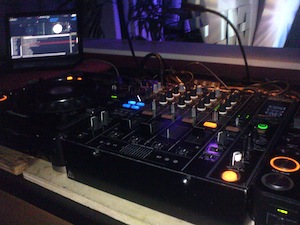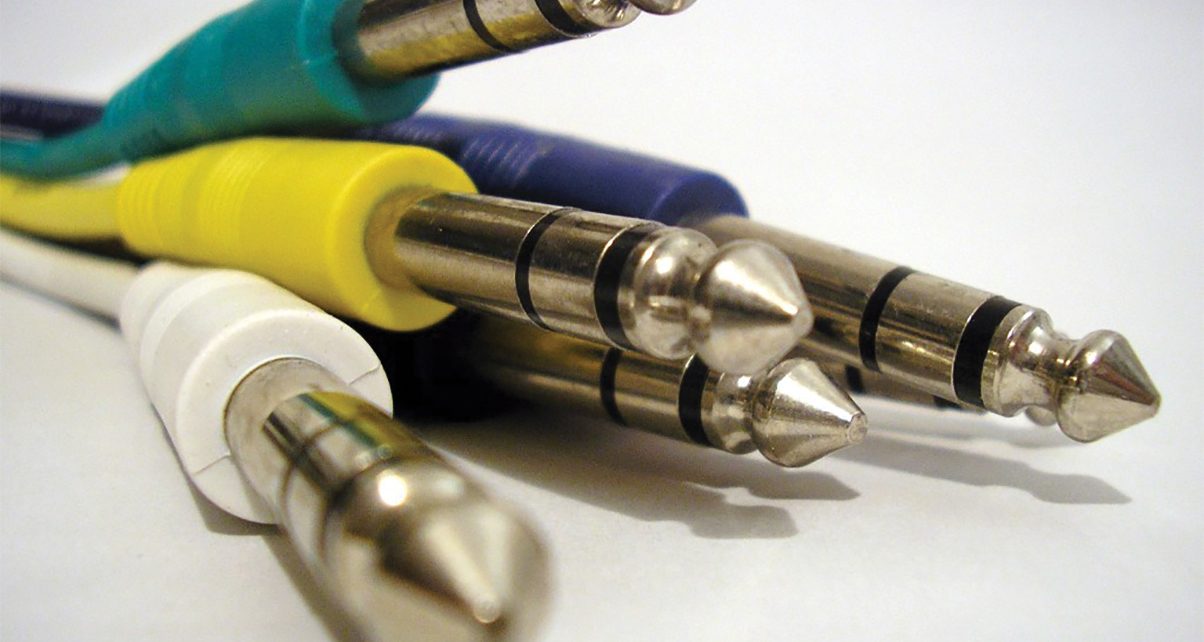
The situation is all too familiar. You look out from behind the booth; everyone is having a great time. The dancefloor is packed, the music is pounding, and you are absolutely rocking the party, but then… silence. The crowd stops and stares back at you blankly for a few seconds. Insults quickly follow: “Booo! You suck! What happened to music?!” “This DJ is lame! Let’s get out of here.” Your mind is racing and fingers are fumbling about while the room gets increasingly hostile. When this unfortunate event happens to you (and if it hasn’t already, believe me, it will!) what should you do to ensure that the control is not lost? What do the pros do? Well, it’s a three-step approach….
The number one key to dealing with technical problems is to make sure you are well prepared. Not only should you have a variety of back-up solutions at your disposal but you should also use foresight to quickly solve sticky situations. Predicting the various scenarios that may occur during a gig and making sure you have the right equipment will save you from a lot of grief later on, especially mid-set.
There are of course, situations for which you simply cannot prepare for, so your secondary saving grace derives from an ability to multitask and think quickly under pressure – skills that come from practice and experience, but which can be taught to a certain extent. Lastly, say you do happen to fall victim to Murphy’s Law and something goes astray despite all your preparation and skills; the diligence you put into reviewing what went wrong afterwards will help prevent problems next time.
So lets look at these before, during and after actions to help prevent the dreaded “radio silence” at your gigs:
Before…
Most technical difficulties arise from equipment, many of which are due to forgetting to bring something (so frustrating!). Furthermore, you need to have a good understanding your equipment and be mindful of what you require to perform efficiently. After all, what good are your party rocking skills and awesome scratching techniques if you can’t showcase your talents because of a faulty plug or a corrupted hard drive? Here’s how to prepare properly:
Have enough cables, cords, adapters
At least two pairs of each. This will ensure that you have back-up cables in case a wire gets damaged as well as extra cord length in case the sound system covers a wide area, plus an RCA to 1/8-inch jack cable (also known as a Y-cable) for emergency Aux In needs.
Make sure you can create every possible combination of audio connection (XLR to RCA, quarter-inch to XLR, etc.) and keep in mind female to male plug compatibility. This is especially important in gigs where you are using a sound system other than your own. I’ll admit that many of my gigs when I first started were thwarted due to incompatible wiring. Just to be safe, you might consider bringing your own mixer to events, especially at nightclubs/bars, where house gear is usually sub-par and victims of fallen drinks and cigarette smoke.
Finally, consider carrying one long extension cord and two surge protectors plus a spare USB cable for your DVS interface or Midi controller.
Learn your software well

If your software allows it, learn how to operate solely in internal mode. With all the possibilities that could go wrong with your controller or DVS system – USB error, needles die, control vinyl/CD missing, buttons stick etc – you need to be able to get by and keep the music going with the most basic and minimal set-up. Setting up cue points for all your tracks and memorising hot key layouts helps immensely. If you are an SSL user, consider a small, portable Midi controller too, to gives you the option of a much lighter back-up set-up (good if you want to play at a house party without having to lug around your 1200s or CDJs, too).
Back your music up
I recommend copying your library onto at least two external hard drives, one kept with you on the road, and the other kept safe back home. Remember to back up often! I recommend using Time Machine for Mac or Acronis True Image Home for PC at least once a week. If you can’t afford to grab this extra hardware, consider creating a separate folder on your desktop of your essential DJ tracks. This 1GB to 2GB-worth of music should be enough to last you an entire gig in case you have issues, and allow you to continue spinning, as long as you can access your drive.
If you store your music internally, then consider partitioning your hard drive so that you can allocate your essential tracks across different locations, and use the second partition to back up your primary drive.
Beef up your laptop
If you can afford it, upgrade your RAM (it will cost you about $100 but the switch from 2GB to 8GB RAM will turn a Macbook into a Crackbook!
During…
So what about these unforeseen obstacles that happen during the gig? The first thing you have to do is pinpoint the source of the problem. Shut out the distractions and focus on your system. Was the power cord tripped? Did a speaker blow out? Maybe your hard drive got disconnected, or you accidentally pressed the reverse cross-fade button (has happened to me multiple times). Whatever the issue, make sure that you have a temporary solution until you can locate the problem. Here are some situations that could occur, and some suggestions on how to resolve them:
No power
If you find that the sound is cut and the LEDs from your mixer/controllers are dark, check your primary outlet to make sure it hasn’t been tripped on. Dial down your mains and check all your power sources. Nothing much you can do to stall so hurry up and plug it back in ASAP!

Remember that your mixer is the heart of your sound system, so check all the levels, reverse buttons, and power before checking other units. If only your controllers are down, check your surge protectors, find the isolation, and turn on your Aux input source. If only the speakers are down, then this usually means that the amp has overheated, and bass usually goes first. This is a time thing, as it needs to cool down. Otherwise your speakers may have blown – not much you can do about that!
Best prevention is to making sure you don’t overwork/clip them during your set and if you are a mobile DJ, investing in a set of speakers that have automatic shut-off if overheated Mackie SRM series or the JBL EON 5 series).
Freeze, or no music
One of the pitfalls of digital. Whenever I see my screen freeze, I still feel a wave of panic curse through me. DJ software can sometimes be wacky with audio dropouts if too much is going on (eg dropping samples on top of both decks while running video). If your program freezes but music is still heard, don’t touch anything and just wait for it to unfreeze (it probably will). If music actually stops playing, have an alternative music source such as an iPod connected to your Aux input via a Y-cable ready to play immediately so you can shift your focus towards troubleshooting the software issue without interrupting the music.
Meanwhile, try to adjust the buffer sampling rate (higher rate decreases load on your computer but also increases the latency) and make sure your computer is not bogged down with other programs. Turn off your wireless, Bluetooth and automatic screensavers and close any other programs other than your primary DJ software.
Crowd issues
While the crowd is the lifeforce of the party, guest antics are probably the biggest distractions while on the job. People will be fighting for your attention to play their requests, make drunken shout-outs on the mic or – my personally favourite – ask you how to DJ. These distractions can invariably lead you to miss your cue points, let the track fade out or cause some other annoying disturbance. To deal with constant requests, consider setting out a notebook and pen so that people can write them down. This way you can just point to the pad and not lose your train of thought while mixing all while keeping record of what songs are popular. For all those nosy, wannabe-DJs, hand them your card and tell them to come back after the night is finished or email you later to talk shop.

If you use turntables and DVS, nothing is more frustrating when some floozy knocks a needle off the record trying to get your attention. For when this happens, set-up a hot key to quickly switch to internal mode so you can readjust the tone arm while the music continues.
After…
No gig ever goes perfectly, despite all your preparation and experience. That’s why the post-gig debrief is so important. It’s OK to make mistakes, but it’s a crime to repeat those mistakes. Try keeping a gig log and recording each event you spin at too. The sooner you do it the better, since the night will still be fresh in your head. Besides jotting down the basic information (eg. date, location, contact, amount paid, etc.), write down some commentary on issues you faced during the event: What requests were you not able to play? Why did the bass cut out in the middle of the event? How come the software was running so slowly? Asking yourself these kinds of questions will help you to prepare for your next event so that you can avoid redundant errors.
Recap the night with guests at your event. Not only does this help you better relate to your audience, but also these people may actually have some constructive feedback to offer and let you know how you handled the night. Additionally, the people who stick around until the end are usually the ones who enjoyed your performance and may be interested in hiring you for their own party.
Conclusion
Having the music cut off can happen for so many different reasons, but if you are able to locate the issue and react quickly, then it won’t seem so scary. And finally, all this work will stand you in good stead for the occasions when you’ll be taking advantage of a free bar tab, as troubleshooting under the influence is typically far less straightforward!
• DJ Keeno aka John Huang is a pre-med college DJ who also runs his own pro DJ company. Check out his blog, visit him on Facebook and follow him on Twitter.
What was your worst gig nightmare? How did you deal with it? Have you got any tips you’d like to add to these? Let us know in the comments please…








